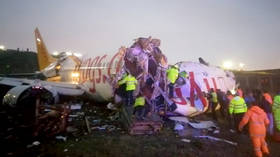West wanted Moscow to open up to international media 30 years ago, now it's discriminating against Russian outlets - FM Lavrov
The West encouraged Russia to launch a new era of transparency during 'perestroika,' yet the very same democracy lecturers are today stigmatizing RT and Sputnik for “state funding” – which its own foreign media outlets rely on.
That's according to Foreign Minister Sergey Lavrov who pointed out that US broadcaster RFE/RL, which is openly state-run, and British outlet BBC are also financed from public funds.
Two of Russia’s broadcasters are facing open discrimination across their countries of accreditation, Lavrov told Sputnik.
RT has been forced to register with the US Justice Department under the 1938 Foreign Agents Registration Act (FARA). Its correspondents have also been barred from attending events hosted by the French president; likewise, RT and Sputnik have faced enormous difficulties while reporting from Baltic nations.
Also on rt.com Twitter labels RT & Sputnik but NOT BBC, NPR & VOA as it launches blitz on state media staff & govt officials“We are being presented with the argument that there is state funding [for RT and Sputnik],” Lavrov commented. Nevertheless, there are is media in the West – the BBC and Radio Liberty being prime examples – that also receive government donations and “are considered beacons of democracy.”
They also rely on state funding, but for some reason no restrictive measures are being taken against them, including through the internet, where censorship is now openly introduced.
This comes as audiences of both broadcasters are growing and their popularity is on the rise. “I saw the statistics; I can only assume that this is another sign of the fear of competition on the side of those who dominated the global information market until recently,” the foreign minister said.
The pressure Western nations pile on Russian media is one reason to wonder if they actually practice what they preach. Lavrov recalled that the West demanded Russia “open up to the world” during the period of perestroika – including by allowing full access “to any kind of information, whether it was based on domestic sources or came from abroad.”
Thirty years later, the West is “already even embarrassed” to stick to the same principles when Russia asks “that access to information be respected, including in France with respect to Sputnik and RT,” Lavrov stated. France has its own state-funded outlets, such as AFP, Radio France International and France 24.
Double standards, hypocrisy – unfortunately, these are the words to describe their position.
Russia will take these matters to the upcoming ministerial summit of the Organization for Security and Co-operation in Europe (OSCE) this December. “These questions will not disappear anywhere from the agenda, our Western colleagues will have a lot to answer,” Lavrov vowed.
Speaking about the pressure put on Russia in general – and often initiated by the media and not among political circles – Lavrov described the current times as “the age of social media, disinformation and fake news.” It is fairly easy “to throw any invention into the media domain” and get away with it, he said, adding, “and then no one will read the rebuttal.”
Like this story? Share it with a friend!















